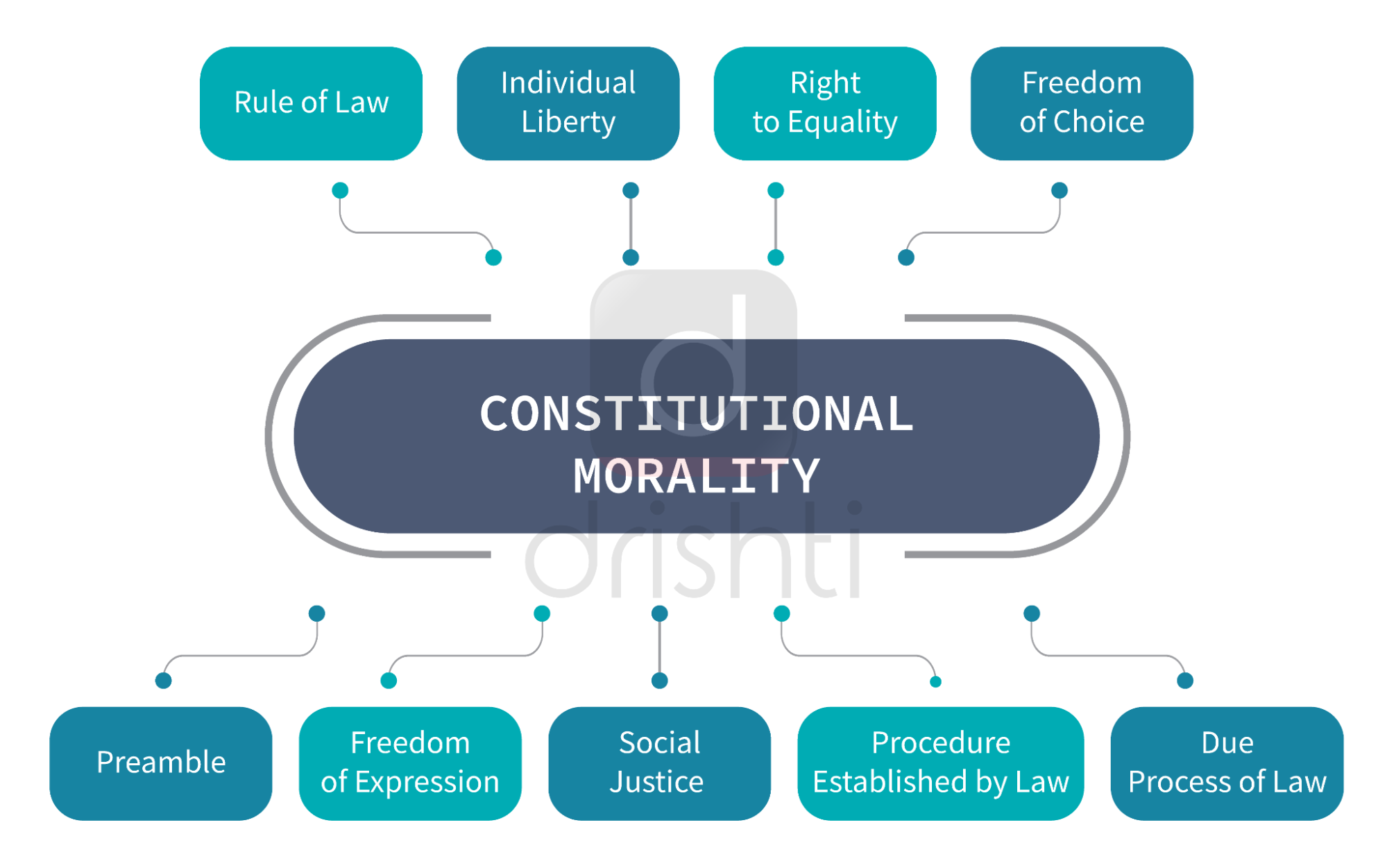Constitutional Morality in India | 31 Oct 2025
For Prelims: Constitutional morality, Pillars of Constitutional Morality, Conditional Morality and Indian Constitution, Directive Principles of State Policy, Fundamental Rights,
For Mains: Challenges to Constitutional Morality in India, Judicial Pronouncements Related to Constitutional Morality in India.
Why in the News?
Constitutional morality in India has gained renewed attention amid ongoing debates on institutional independence, rule of law, and ethical governance, highlighting its critical role in shaping democratic conduct and upholding constitutional values.
What is Constitutional Morality?
- About: It is defined as a “paramount reverence for the forms of the Constitution” that ensures obedience to lawful authority while allowing freedom of expression and dissent.
- It refers to the adherence to the Constitution not just in letter, but in spirit.
- The idea of constitutional morality was introduced by the British historian George Grote as a balance between freedom and restraint, where citizens uphold constitutional authority while retaining the right to openly critique those in power.
- Dr. Ambedkar’s Thought on Constitutional Morality: Dr. B.R. Ambedkar invoked Grote’s idea to stress the importance of cultivating a deep respect for constitutional processes. Ambedkar observed that “constitutional morality is not a natural sentiment-it has to be cultivated”.
- Pillars of Constitutional Morality:
- Constitutional Values & Rights: Upholding justice, liberty, equality, fraternity, secularism, and protection of fundamental rights.
- Rule of Law & Accountability: Ensuring all, including those in power, are bound by law through checks, balances, and democratic participation.
- Ethical & Transparent Governance: Promoting integrity, responsibility, and transparency in public affairs.
How has the Judiciary Applied Constitutional Morality to Advance Social Reform in India?
- Protection of Privacy and Human Dignity: In Justice K.S. Puttaswamy (Retd.) v. Union of India (2017), the SC recognised the right to privacy as a fundamental right, holding that dignity, autonomy, and liberty are essential components of constitutional morality.
- Preservation of Constitutional Values: In Kesavananda Bharati v. State of Kerala (1973), the Court established the Basic Structure Doctrine, ensuring that parliament cannot alter the essential democratic and secular features of the Constitution.
- LGBTQ+ Rights: In Naz Foundation v. NCT of Delhi (2009) and later reaffirmed in Navtej Singh Johar v. Union of India (2018), the SC held that constitutional morality must prevail over societal prejudice and decriminalised consensual same-sex relations.
- Gender Equality and Religious Reform:In Indian Young Lawyers Association v. State of Kerala (Sabarimala, 2018), the SC struck down the ban on entry of women into the Sabarimala Temple, holding that gender equality and liberty outweigh discriminatory religious customs.
- Gender Equality and Marital Reform: In Joseph Shine v. Union of India (2018), the Court decriminalised adultery by striking down Section 497 of the IPC, reaffirming gender equality and recognising women’s autonomy within marriage.
What are the Challenges to Constitutional Morality in India?
- Political Interference: The increasing political influence over constitutional and statutory bodies has raised concerns, as seen in recent developments like the judiciary ruling on the Governor's role in withholding assent to state bills, highlighting tensions between institutional autonomy and political intervention.
- Judicial Activism vs. Restraint: While cases like Vishaka v. State of Rajasthan (1997) show how judicial activism can advance rights, excessive judicial overreach risks upsetting the separation of powers.
- Weak Enforcement: Delays in implementing key rulings such as the Vineet Narain (1998) judgment on institutional accountability and poor awareness of rights erode the force of constitutional morality.
- Societal Resistance: Deep-rooted caste hierarchies, gender discrimination, and religious orthodoxy- seen in issues like temple entry or inter-caste marriages-continue to obstruct equality and fraternity envisioned by the Constitution.
How can Public Institutions Uphold Constitutional Morality?
- Strengthening Institutions: Bodies responsible for governance, investigation, and oversight(Election Commission, CBI, and NIA) must operate autonomously and without political interference to uphold constitutional values and public trust.
- Enhancing Access to Justice: Simplifying legal procedures, reducing judicial backlog, and improving legal aid can ensure equality before the law.
- Encouraging Ethical Leadership: Public officials must demonstrate integrity, accountability, and adherence to constitutional principles.
- Promoting Civic Education: Educating citizens, especially youth, about constitutional rights and responsibilities can cultivate constitutional culture.
Conclusion
Dr. B.R. Ambedkar’s warning that “constitutional morality is not a natural sentiment-it has to be cultivated” remains deeply relevant today. For India’s democracy to flourish, both citizens and leaders must internalise the spirit of the Constitution. When constitutional morality guides governance and public life, the Constitution ceases to be a mere legal document-it becomes a living charter of justice, liberty, equality, and fraternity for all Indians.
|
Drishti Mains Question Q. Discuss the significance of Constitutional Morality in strengthening democratic governance and ensuring the ethical functioning of constitutional institutions in India |
Frequently Asked Questions
Q.Who introduced the concept of Constitutional Morality?
Historian George Grote introduced the term in History of Greece (1846); Dr. B.R. Ambedkar later adapted it for India’s constitutional framework.
Q.What does Constitutional Morality mean in India?
It refers to adherence to the constitutional values of justice, liberty, equality, and fraternity by citizens and public officials alike.
Q.How is Constitutional Morality different from societal morality?
While societal morality changes with time, constitutional morality upholds enduring principles like equality, liberty, and human dignity, even against popular opinion.
Q.Which Supreme Court judgments highlighted Constitutional Morality?
Key cases include Kesavananda Bharati (1973), Naz Foundation (2009), Sabarimala (2018), and Navtej Singh Johar (2018) reaffirming equality and constitutional values
UPSC Civil Services Examination Previous Year’s Questions (PYQs)
Mains:
Q: What is meant by the term ‘constitutional morality’? How does one uphold constitutional morality? (2019)
Q. “Constitutional morality is the fulcrum which acts as an essential check upon the high functionaries and citizens alike…”
Q. In view of the above observation of the Supreme Court, explain the concept of constitutional morality and its application to ensure balance between judicial independence and judicial accountability in India. (2025)

